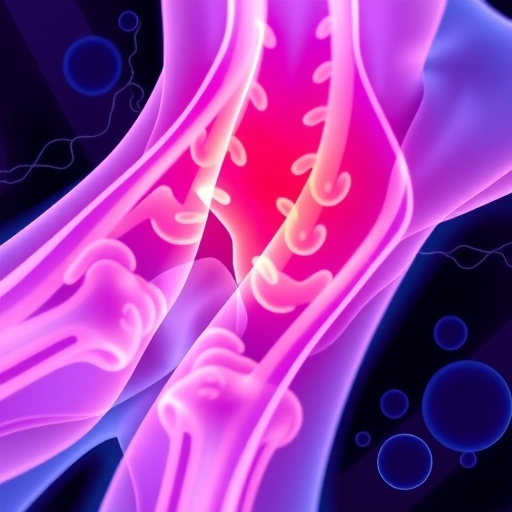Systemic sclerosis, a complex autoimmune condition characterized by fibrosis of the skin and internal organs, has remained enigmatic for many researchers in the field of immunology. Recent studies suggest that understanding the molecular mechanisms and clinical manifestations of this disease requires a multidisciplinary approach that integrates both clinical data and molecular insights. The PRECISESADS study, spearheaded by renowned researchers like Dans-Caballero and Ortega-Castro, aims to illuminate the intricate connections between these two realms.
One of the defining features of systemic sclerosis is its heterogeneity, which manifests not only in symptoms but also in patient responses to treatment. This is particularly notable when comparing limited and diffuse forms of the disease. The disparities in disease progression and organ involvement underscore the necessity for a tailored approach to patient management, informed by molecular profiles that delineate risk factors for organ damage. This necessitates a thorough investigation of the biological markers that correlate with disease severity, which the PRECISESADS study aims to elucidate.
The ongoing research illuminates a viable path for integrating genetic, environmental, and immunological factors influencing the disease’s activity. Central to understanding these factors is the examination of specific biomarkers that may help identify patients at higher risk of severe organ involvement. Such identification would revolutionize how clinicians approach the treatment of systemic sclerosis and enable earlier, more aggressive interventions for those who need them.
What makes the PRECISESADS study particularly pivotal is its large-scale, multicentric design that seeks to collect comprehensive data from diverse populations. This diversity enhances the external validity of the findings, ensuring that the insights gleaned are not confined to a single demographic but can be generalized across various patient populations. Importantly, the study’s collaborative nature draws on the expertise of clinicians, geneticists, and molecular biologists to provide a well-rounded analysis of systemic sclerosis.
Furthermore, researchers are increasingly recognizing the role of the microenvironment in systemic sclerosis. Inflammatory processes and immune system dysregulation may not occur in isolation but rather are intrinsically linked to the cellular makeup of the tissues affected by the disease. Investigating the interactions between immune cells and fibrotic tissue could reveal novel therapeutic targets and inform us about the dynamics of disease progression.
As part of their comprehensive approach, the PRECISESADS study emphasizes the importance of longitudinal assessments. This fosters an understanding of how systemic sclerosis evolves over time, allowing researchers to track changes in biomarkers and clinical symptoms. Such a temporal perspective is essential for optimizing treatment protocols and understanding long-term patient outcomes.
One of the most exciting prospects emerging from this research is the potential for precision medicine in treating systemic sclerosis. Personalized approaches that consider individual genetic and molecular profiles could lead to more effective treatment strategies, minimizing the trial-and-error methodology that often plagues physicians today. By aligning therapeutics with patients’ specific disease characteristics, clinicians could improve both the efficacy and safety of interventions.
Moreover, the study highlights the importance of patient-reported outcomes in assessing the effectiveness of treatment modalities. Incorporating patients’ perspectives ensures that clinical research aligns with the actual experiences and needs of those living with systemic sclerosis. Such an integrated model of care may prove vital in devising holistic treatment plans that cater to the physical and emotional well-being of patients.
The preliminary results of the PRECISESADS study have already begun to reshape our understanding of the disease landscape. While the work is ongoing, early findings suggest that key biomarkers could predict organ involvement, leading to earlier intervention and potentially improved outcomes. As researchers continue to analyze the data, these insights may serve as keystones for future studies and clinical practices.
Ultimately, the study underscores a pivotal shift in how systemic sclerosis is understood and treated. Traditional models have often failed to capture the disease’s complexity, and the integration of clinical and molecular insights could finally offer a way to bridge this knowledge gap. As the research evolves, it promises not only to enhance our understanding of the underlying biology but also to translate these insights into more effective interventions for those affected by systemic sclerosis.
In closing, the findings from the PRECISESADS study are poised to pave the way for transformative changes in the management of systemic sclerosis. The potential to develop personalized treatment plans based on a robust understanding of both the clinical and molecular underpinnings of the disease heralds a new era of care for patients. As this research progresses, it holds the promise not just of enhanced survival but also of improved quality of life for individuals battling this challenging condition.
As we anticipate further outcomes from the PRECISESADS study, it is crucial for the scientific community and healthcare providers to stay vigilant about the emerging insights. Continued collaboration and an open exchange of knowledge across disciplines will be essential for translating these findings into clinical practice. Keeping the patient at the center of this process will be paramount in ensuring that systemic sclerosis management evolves in response to real-world needs and challenges.
In summary, the future of systemic sclerosis research and management looks promising, with efforts like the PRECISESADS study driving innovation and discovery. The field stands on the cusp of potentially groundbreaking advancements that could alter the course of treatment and greatly enhance the lives of those living with this complex condition.
Subject of Research: Systemic Sclerosis
Article Title: Systemic sclerosis: bridging clinical and molecular insights: results from the PRECISESADS study.
Article References:
Dans-Caballero, S., Ortega-Castro, R., López-Pedrera, C. et al. Systemic sclerosis: bridging clinical and molecular insights: results from the PRECISESADS study.
J Transl Med (2025). https://doi.org/10.1186/s12967-025-07469-0
Image Credits: AI Generated
DOI:
Keywords: systemic sclerosis, PRECISESADS study, biomarkers, precision medicine, autoimmune disease, clinical insights, molecular insights, longitudinal assessments




